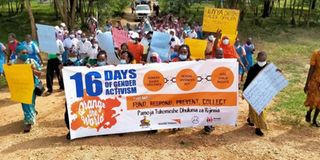Ending SGBV requires open talks about stereotypes, norms

Religious leaders and activists in Lamu march to protest against increased child defilement and gender-based violence cases in the region.
What you need to know:
- Sexual violence is an entire society’s problem because it affects us all.
- During Covid-19, violence in the home has become what the global community call, the ‘shadow pandemic’.
- In Kenya, statistics record 45 per cent of women and girls aged 15-49 have experienced SGBV.
- Victim-blaming, trivialising of rape and the stigma faced by survivors are still far too common.
- The socialisation of boys at an early age can have a long-term impact in shifting gender norms.
Sexual violence is not a women’s problem, nor a girl’s problem. It is an entire society’s problem because it affects us all. Breaking down harmful stereotypes and bringing men and boys into the conversation are two of the most important norm changes we collectively need to nurture.
Sexual violence and harassment take place in our homes, public spaces, workplaces, on the streets and in our education institutions. Exposure is heightened in conflict and emergency contexts.
During Covid-19, violence in the home has become what the global community call, the ‘shadow pandemic’. Reports from Kenya’s national helpline that responds to sexual and gender-based violence (SGBV) has seen a huge spike in calls since the pandemic began.
Early and forced marriage
Women and girls in Kenya often experience alternate but equally damaging forms of SGBV, both mentally and physically, including child, early and forced marriage, female genital mutilation and femicide. One in three women globally are affected by gender-based violence, and in Kenya, statistics record 45 per cent of women and girls aged 15-49 have experienced SGBV. One in five women have suffered from female genital mutilation (FGM) in Kenya and 23 per cent of the nation’s girls are married before their 18th birthday, while four per cent are married before their 15th birthday.
The exact numbers of rape and sexual assaults are difficult to assert due to reluctance or fear for victims to report it, and inefficiency in addressing the reports adequately because of lack of capacity and resources and sometimes will.
We are daily witnesses to ‘rape culture’, sometimes even silent bystanders. Society has entrenched the use of misogynistic language, the objectification of women’s bodies on screens, indifference to consent, and the glamorisation of violence in advertisements.
Victim-blaming
Victim-blaming, trivialising of rape and the stigma faced by survivors are still far too common. The understanding of mutual consent; that only yes means yes, given freely without manipulation or coercion – is paramount in the prevention and eradication of rape and sexual harassment.
Male involvement in ending SGBV is particularly crucial as many Kenyan communities remain highly patriarchal. As authority figures, men hold more power and influence over decision-making in the social domain and are often considered the custodians of culture. They are in a position to determine the cultural traits, behaviours and social practices that are viewed as either good or harmful.
The socialisation of boys at an early age can have a long-term impact in shifting gender norms. Some harmful traditional notions of masculinity have been identified as the key drivers of aggression among the male gender.
These include expectations of what it is “to be a man,” where boys are expected to be physically strong, aggressive, showing little emotion in order to maintain the tough persona. What boys learn about expectations of femininity and the value of women and girls at home and in the community also shapes their attitudes towards SGBV.
Healthy masculinity
Efforts should aim at engaging men on the dangers of toxic masculinity and internalised gender bias that can be harmful to the well-being of women and girls. By teaching boys about healthy masculinity, as well as the links between gender inequality and violence against women, we can begin to promote positive behaviours and attitudes towards women’s rights, while eliminating harmful gender stereotypes.
The government has clear legislation and policies on preventing and responding to SGBV. The State Department for Gender is coordinating efforts from a multi-sectoral approach to advocate for this cause. President Uhuru Kenyatta has made firm commitments towards the eradication of GBV and harmful practices by 2030 and to eradicate the practice of FGM by 2022. This strong commitment and leadership is a source of inspiration for all actors, including cultural and religious leaders and calls for concerted efforts to stop the violation of human rights.
16 Days of Activism to End Gender-Based Violence is an international campaign calling for the prevention and elimination of all forms of violence against women and girls. During the 16 days, from November 25 until December 10, we call on people from all walks of life to question those harmful stereotypes and norms that perpetuate violence. No further generations must struggle to cope with a legacy of violation.
If you or someone you know has experience some form violence – call the toll-free line 1195 or Childline 116 to report your case and seek support. You are not alone.
Prof Margaret Kobia is the CS Gender and Public Service, Dr Ademola Olajide is the Country Representative UNFPA and Anna Mutavati is the Country Director UN Women





